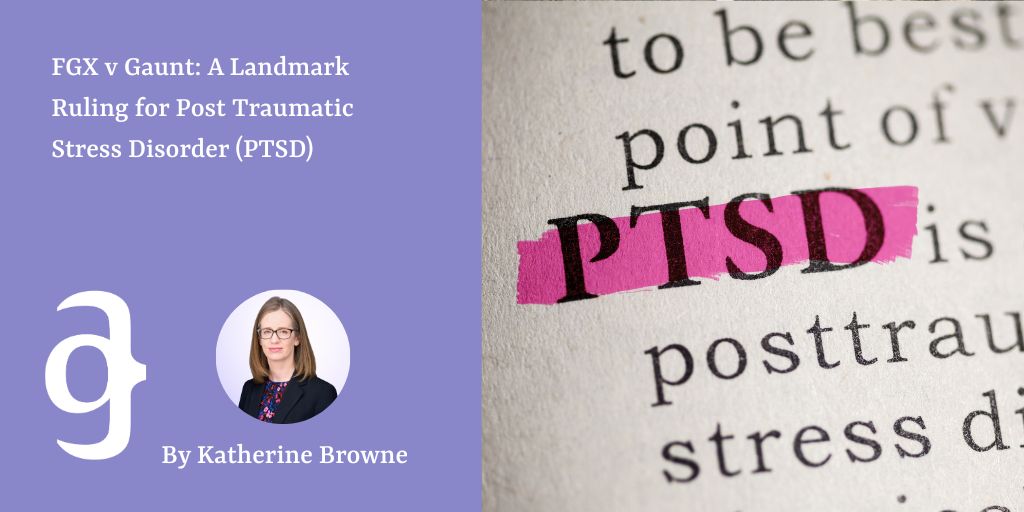FGX v Gaunt: A Landmark Ruling for Post Traumatic Stress Disorder

In the case of FGX v Gaunt, for the first time, the Court awarded compensation for post traumatic stress disorder resulting from sharing of pornographic images on the internet.
Since 2015, image-based abuse (the disclosure of private sexual photographs or films of an individual without their consent) has been a convictable offence.
This decision however now means that those who suffer psychiatric injury as a result of this type of conduct can now receive compensation. This decision is the first of its kind, but happily, I suspect it will not be the last.
FGX v Gaunt: Background
The claimant was living with the defendant at the time of the offences. In October 2017 she discovered that he had secretly filmed her in various scenarios, including whilst she was sleeping topless; while naked in the bathroom, and while she was showering. He had then published the photos on a pornographic website alongside a photograph of her face, making it easy to identify her.
When she discovered what her partner had done, the claimant developed chronic post-traumatic stress disorder leading to an “enduring personality change”.
The Court awarded compensation both for the psychiatric injury and the financial losses that stemmed from it. In total, she was awarded just over £97,000.
Compensation for Post-Traumatic Stress Disorder (PTSD)
As an injury solicitor, I understand the far-reaching impact and the trauma a defendant’s negligence can have on the individual. Here, the claimant developed chronic post traumatic stress disorder the lasting impact of which was to cause a permanent and negative change in her personality.
This personality change was largely due to her preoccupation with the knowledge that the intimate images remained on the internet, out of her control, and still accessible to the public. It was a barrier to her recovery.
The defendant’s conduct caused trauma and severely damaged the claimant’s ability to trust and interact with others and engage in future relationships, both personally and at work. She was unable to continue with her career and changed to a job where she could work from home.
How was the Traumatic Injury Assessed?
In all cases, the starting point when attaching a financial value to any injury is to research what the Court has awarded in previous cases for similar injuries using standard published compensation guides for this exercise. As the decision here was the first of its kind, there was no previous case for the Court to look to when assessing the amount of compensation.
The Court took, as their starting point, the level of award that had been made in the past for psychiatric and psychological damage caused by sexual and/or physical abuse. They accepted that the impact on the claimant was akin to the impact of sexual assault, albeit that the abuse in this case was image-based rather than physical.
The Court also considered cases on the misuse of private information including the case of Reid v Price [2020] EWCA 594 (QB) and Bull v Desporte (2019) EWHC 1650 (QB). The first case awarded £25,000 for the sharing of video recordings and photographs of a sexual nature to the defendant’s friends and acquaintances. The second awarded £10,000 as intimate details of a sexual relationship were included in the defendant’s published book. However, neither case demonstrated that the claimant had sustained post traumatic stress disorder as a result of the defendant’s behaviour.
Cases involving other comparable violations were also reviewed namely the intentional infliction of harm (ABC and WH v Willock (2015) EWHC 2687), and the publishing of private information i.e. Phone hacking (Representative Claimants v MGN Limited (2015) EWCA CIV1291).
Drawing these authorities together with guidance from the published compensation guides, the Court awarded £60,000 for post-traumatic stress disorder.
The claimant was also entitled to claim compensation for the financial losses that stemmed from the violation. This included an award for £21,600 as the estimated cost of removing significant content from the internet. This was supported by an expert report.
Focusing on the Post Traumatic Stress Injury caused to the claimant
Early in the judgment, the Court was keen to dismiss the phrase “revenge pornography” as it conveyed the impression that a victim somehow deserved what happened to them. Instead, the Court adopted the term “image-based abuse.” I would hope that in time this term replaces the former. It is a welcome finding and places the fault for causing the trauma and the injury squarely on the shoulders of the defendant alone. The claimant’s conduct is irrelevant.
Further, in criminal proceedings, a successful conviction depends on proving that the defendant intended to cause the victim distress. Not so with a personal injury claim. The case is built on proving the extent of the injury caused to the individual. The claimant is at the centre of the claim.
As our specialist team of lawyers know, catastrophic injuries caused by negligence (psychiatric or otherwise) have a devastating effect on the claimant’s life. We always put our clients at the centre of their claim and work hard to support them and ensure they are compensated fully and fairly for their injuries.
* Disclaimer: The information on the Anthony Gold website is for general information only and reflects the position at the date of publication. It does not constitute legal advice and should not be treated as such. It is provided without any representations or warranties, express or implied.*
No comments